You can start a profitable blog in Cameroon. If you take blogging seriously, it will make you thousands of dollars passively, which translates to lots of CFA francs.
The current economic state doesn’t favor most of us, so looking for a source of income to stabilize yourself is definitely worthwhile.
Affiliate Disclosure: This post may include affiliate links with special discounts. Using them saves you money and supports our site at no extra cost to you. Win-win right? Check out our [Privacy Policy] for more details. Thanks for your support!
What Is A Blog?
A blog is a simple website used for publishing web posts related to your niche. These types of posts are generally known as blog posts.
They are accessible online and on Google search results when people look for information related to the ones you’ve published on this site.
You can monetize these posts by placing display ads on them so that when people view or click them you will make money.
You can also monetize your content with several other methods, like affiliate and sponsorships, which will help to boost your blogging revenue.
Why Start a Blog in Cameroon?
- Low Startup Cost – Launch your blog for just 2,000 CFA/month (cheaper than TV subscriptions!).
- Recommended: Best Web Hosting for Bloggers (from $3.5/month).
- Passive Income Potential – Earn thousands of dollars monthly with a few hundred posts.
- Example: How This Blog Makes $3,000/Month.
- No Degree Needed – Be your own boss—no qualifications required.
- Promote Your Business – Attract customers digitally as more Cameroonians go online.
- Tip: Monetize Your Blog Fast.
Start now—it only grows over time!
How Much Money Can You Make as a Blogger in Cameroon?
You can make as much as $5,000 [₣3.2m FCFA] every month passively.
Some blogs are making more than $50,000 [₣32m CFA Francs] per month. This is extraordinary for an average Cameroonian but this is what people are making over here on the internet.
To make as much as mentioned above, here are the things that matter the most;
- How profitable are the posts you publish [primarily depends on your niche]
- The amount of traffic you receive every month
- The number of blog posts you publish
- The satisfaction rate of your blog posts to its audience [your content quality]
- Your methods of monetization
All of these things determine your monthly income.
All of these things determine your monthly income. If you can choose any niche at all, and gradually learn about it to create lots of competitive, useful content, you can at least get to $2,000 [₣1.3m CFA Francs] per month after 3 months or 6 months, depending on how fast you can create your content.
What You Need to Start a Blog
StartiStarting a blog is almost as simple as creating a Facebook account, though it might seem tricky at first. Here’s what you need to get your blog up and running:
- Computer or Laptop – You’ll need one to set up and manage your blog easily.
- Domain Name – This is your blog’s name. Choose something catchy or related to your topic.
- Blogging Platform – Use a Content Management System like WordPress, the most popular platform that doesn’t require coding. It’s beginner-friendly and highly customizable.
- Web Hosting – This keeps your blog online and accessible. We recommend HostGator for reliable hosting.
Tip: After signing up for hosting (like with HostGator), you can install WordPress directly from your account to start building your blog.
How to Start a Blog In Cameroon: Step by Step
In this guide, I’ll be using HostGator because it’s one of the most reliable and beginner-friendly web hosting services out there.
Steps to Start Your Blog:
Step 1: Choose a profitable niche
Step 2: Go to HostGator to get started
Step 3: Pick a hosting plan that suits your needs
Step 4: Choose a domain name for your blog
Step 5: Set your preferred billing period
Step 6: Create your HostGator account
Step 7: Install WordPress directly from your HostGator dashboard
Step 8: Start managing your blog through WordPress and explore the settings
Step 1: Choose a Profitable Niche
What is a niche: A niche is the area of content your blog post will be based upon.
Choosing a niche is all about deciding which area of blogging you are going into.
For example, if you want to create and grow a TikTok account or a YouTube channel the area of content you will be creating and posting about is what is known as your niche, like gaming, finance, comedy, politics, food, fashion the list goes on and on.
Sometimes it can be difficult to choose a niche but you can decide about this later when you are done creating your blog and you can as well change your niche by simply covering more content about the new niche, it’s as simple as that.
Below are some popular examples of profitable blogging niches with their sub-niche main topic ideas.
As you go into one sub-niche you can always expand to other sub-niches to find more content ideas since they are all still related.
[1]. Finance – Blogs about managing money, investing, saving, budgeting, and everything under business and financing.
- Sub-niches: Personal finance, investing, saving tips, cryptocurrency, business finance, frugal living, and financial independence.
[2]. Fashion – Blogs focused on clothing, style trends, and fashion advice.
- Sub-niches: Canadian fashion, streetwear, African designs, fashion trends, DIY fashion, and sustainable fashion.
[3]. Relationship – Blogs that provide advice, tips, and stories about love, family, and friendships.
- Sub-niches: Dating, marriage advice, family relationships, self-love, breakup recovery, and parenting relationships.
[4]. Product Review – This is about the review of products to help people make good buying decisions.
- Sub-niches: Electronics reviews, beauty product reviews, book reviews, tech gadgets, home appliances, and fashion product reviews.
[5]. Food – Blogs about cooking, recipes, and food experiences.
- Sub-niches: Cameroonian cuisine, healthy eating, vegan recipes, street food, baking, food reviews, and restaurant experiences.
[6]. Marketing – This is about how to promote a business, products, and services to grow audiences, sales, or a business as a whole.
- Sub-niches: Digital marketing, social media marketing, email marketing, content marketing, influencer marketing, and SEO.
[7]. Tech – The tech blog is about discussing technology, gadgets, and innovations, and much more.
- Sub-niches: Mobile tech, software reviews, tech tutorials, gadgets, AI, and app development.
Step 2: Use HostGator to Get Started
HostGator is your starting point, it gives you direct access to “WordPress” your blogging platform, and offers you a free domain name of your choice while keeping your WordPress site online. Using some other web hosting provider may seem complicated and require unnecessary configurations.
Using our HostGator discount link you get to pay less than its original price of $3.85/month.
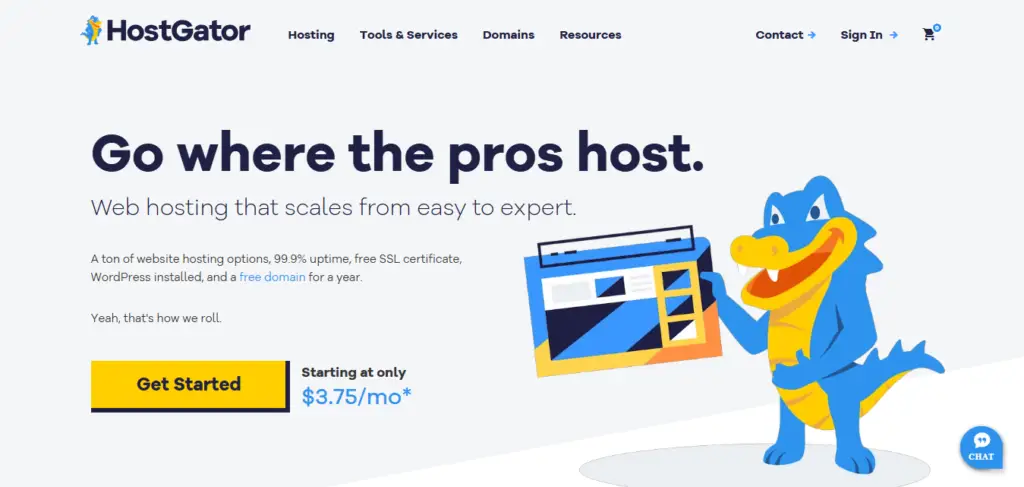
Step 3: Choose Your HostGator Plan
The Hatchling Plan is the most affordable option and perfect for beginners. You can always upgrade later as your blog grows.
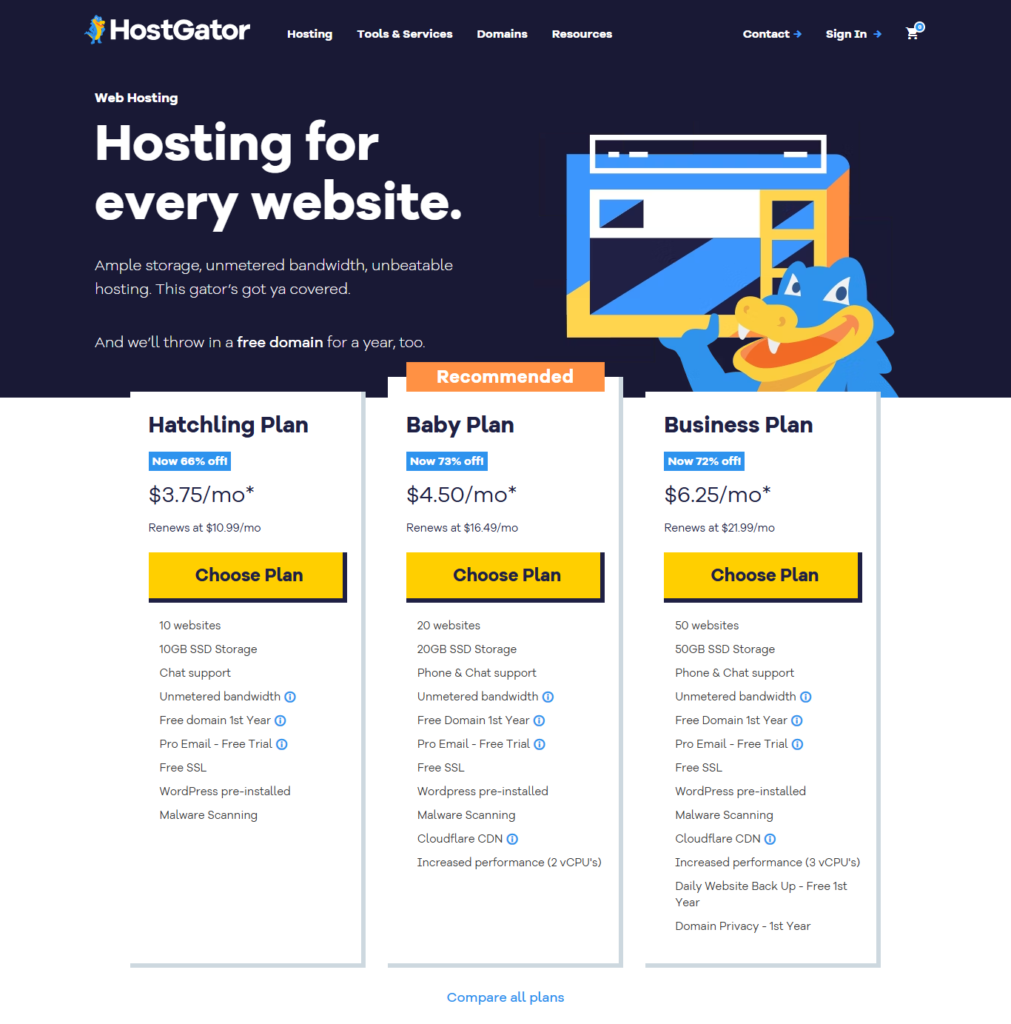
Step 4: Pick Your Domain Name
Once you’ve selected your plan, you’ll be taken to a page where you can choose a domain name for your blog. This is the web address people will use to find you, so make it relevant and easy to remember.
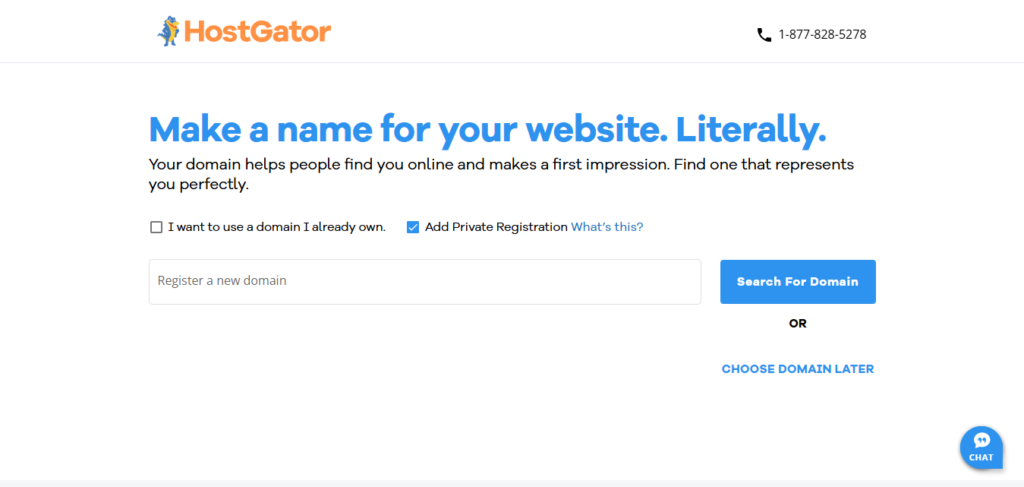
Tips for Choosing the Perfect Blog Domain Name
- Keep It Simple and Memorable: Choose a name that’s easy to spell and remember. Avoid tricky spellings, hyphens, or numbers.
- Reflect Your Niche: Your domain should hint at your blog’s topic. Including niche-related keywords can help with recognition and SEO.
- Short Is Best: Aim for 6–14 characters. Shorter names are easier to recall and type.
- Make It Clear and Easy to Say: Avoid confusing combinations or double letters that are hard to pronounce or read aloud.
Need help brainstorming? Check out these unique blog name ideas.
Step 5: Set Your Hosting Duration
Confirm you’re still on the Hatchling Plan (usually shown on the left side), then choose your billing cycle—either 12 months or 36 months, depending on your budget. Longer plans often come with better discounts.
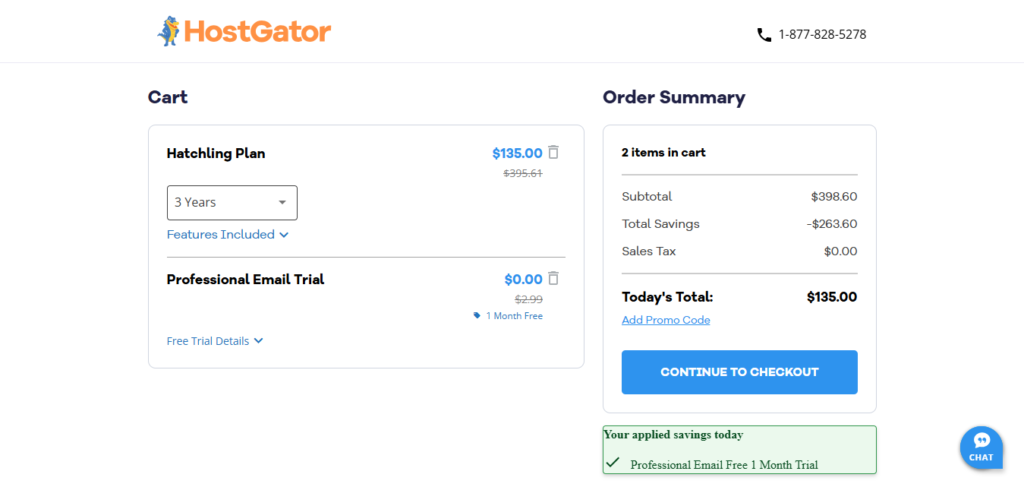
Step 6: Complete Your Account Registration and Checkout
Enter your email, set a secure password, and fill in your billing details. Once everything looks good, finalize your purchase to complete the sign-up process.
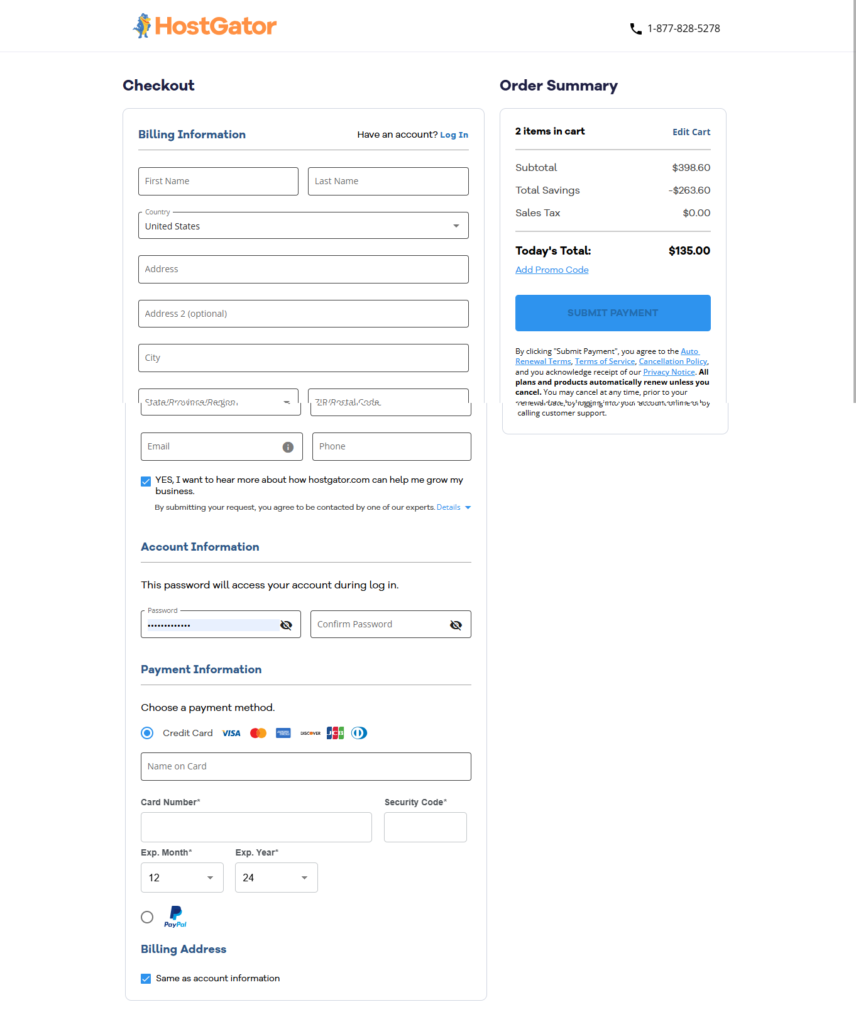
Double-check all your details—hosting plan, domain name, billing info, and account settings. Make sure everything is correct before clicking the Checkout button to complete your purchase.
Step 7: Install WordPress from Your HostGator Account
Action required – After completing your HostGator sign-up, follow the on-screen prompts to begin installing WordPress.
Alternatively, log into your HostGator account and:
- Look for a section labeled “Websites” or “WordPress.”
- Click on it to start the WordPress installation process.
- You’ll be guided to create your WordPress login credentials.
- Once setup is complete, you’ll be automatically logged into your new WordPress dashboard.
- From there, you can start creating blog posts, customizing your theme, and building your site.
Step 8: Explore and Manage Your Blog in WordPress
- Once your blog is set up through HostGator, take some time to get familiar with WordPress.
- It might feel a bit overwhelming at first—but don’t worry, it gets much easier with a little practice.
- Within a week or so of using it, you’ll start to feel more confident managing your blog, creating posts, and customizing your site.
💡 Need help getting started? Watch the video below for a step-by-step walkthrough on using HostGator and WordPress to launch and manage your blog.
Congratulations! You’ve now created a fully functional blog ready to share your niche content. Your site is live and accessible on Google and across the web. Time to start blogging!
Section 3: How To Grow Your Blog
The growth of your blog is not affected by your location in Cameroon, except your content caters for just Cameroonian audience aside from that anyone around the world can find your blog mainly through Google or by any other means.
- How to find blog post topic ideas and write them
- How to monetize your blog effectively
- How to get traffic to your blog
How to Find Blog Post Topic Ideas in Your Niche.
Below are several methods you can use to find blog post topic ideas in your niche.
1. Keyword Research
- Google Autocomplete: Start typing a topic into Google’s search bar and see what suggestions pop up. These are real queries people are searching for.
- Answer the Public: This free tool generates a list of common questions related to your topic based on search volume.
- Keyword research tools: Use platforms like Ahrefs, SEMrush, or Ubersuggest to find trending keywords in your niche. These can point to topics people are actively looking for.
2. Competitor Analysis
- Check other blogs in your niche: Review content from competitors and identify any gaps in their coverage or ideas you can expand on.
- Social listening: Monitor social media conversations around your competitors’ content. See what people are sharing or commenting on.
3. Topic Generator Tools
- HubSpot’s Blog Ideas Generator: Enter a few nouns and get a week’s worth of blog post ideas.
- Portent’s Content Idea Generator: This tool suggests catchy headlines that can spark blog post ideas.
- BlogAbout: It generates blog post title ideas by entering keywords.
To save you the hustle we have lists of handpicked blog post topic ideas in different niches and their sub-niches here – Blog Post Topic Ideas –
Related – How To Write A High-quality Blog Post
How to Monetize Your Blog Post Effectively
Monetizing your blog effectively involves utilizing multiple methods of monetization that can generate revenue while maintaining the quality of your content and serving your audience’s interests.
Here are several approaches you can take to monetize your blog;
1. Display Ads
- Google AdSense: Google AdSense is one of the easiest ways to start monetizing your blog. It automatically places relevant ads on your site, and you earn money when users click on or view the ads.
- Ad networks: In addition to AdSense, you can also join ad networks like Media.net, PropellerAds, or AdThrive (for high-traffic blogs) to display targeted ads on your blog.
- Direct Ad Sales: If you have a large following, you can sell ad space directly to businesses or brands within your niche. This offers higher income per ad.
2. Affiliate Marketing
- Join Affiliate Programs: Promote products or services relevant to your blog’s niche and earn a commission for each sale made through your affiliate link. Popular affiliate programs include Amazon Associates, ShareASale, Rakuten, and CJ Affiliate. Other affiliate programs.
- Write Product Reviews: Write detailed reviews of products or services you genuinely use or recommend. Include your affiliate links within the reviews. Examples of affiliate posts that will make you money fast.
- Create Resource Pages: Design a dedicated “resources” or “toolkit” page where you share the best products, tools, or services in your niche, all linked through your affiliate links.
These two mentioned above are the most popular ways you can use to monetize a blog especially a new blog.
There are other methods of monetization you can use to monetize your blog but they are more suitable for blogs that has some traffic coming in already, you can find these other methods here “7 Ways To Make Money Blogging“.
How to Get Readers to Your Blog
Driving traffic to your blog is key to your success. More visitors mean better visibility, higher earnings, and a bigger, more engaged audience.
Here are some of the best strategies to boost your blog traffic:
1. Search Engine Optimization (SEO)
- Keyword Research: Identify relevant keywords using tools like Google Keyword Planner, Ahrefs, or SEMrush. Focus on both high-traffic keywords and long-tail keywords (specific, less competitive phrases).
- On-page SEO: Optimize your blog posts for SEO by including the target keyword in the title, URL, header tags (H1, H2), and throughout the content. Also, use proper formatting like bullet points, short paragraphs, and optimized images with alt text.
- Quality Content: Focus on creating high-quality, valuable, and unique content that answers common questions or solves problems. Google rewards helpful and comprehensive content with better rankings.
- Internal Linking: Link to other relevant posts on your blog to keep readers engaged and help search engines crawl your site more effectively.
- Mobile Optimization: Ensure that your blog is mobile-friendly. Google prioritizes mobile-optimized sites in its search rankings.
- Page Speed: Optimize your website’s speed. A slow-loading site can hurt your rankings and drive visitors away.
Related – How you can properly optimize your blog for SEO
2. Promote On Social Media
- Share Your Posts: Promote your blog posts on social media platforms like Facebook, Twitter, Instagram, LinkedIn, and Pinterest. Tailor the message for each platform and include an eye-catching image.
- Use Hashtags: Use relevant hashtags to reach a larger audience. On Instagram and Twitter, hashtags help categorize content, increasing discoverability.
- Engage with Followers: Actively respond to comments and messages, engage in conversations, and share content from others. Building a relationship with your followers increases the chances they will share your content.
- Join Relevant Groups: Participate in Facebook groups, LinkedIn groups, or Reddit communities related to your niche. Share valuable insights and link to your blog posts when appropriate (without spamming).
- Pinterest: If you have visually appealing content, use Pinterest. Create compelling pins that link back to your blog, and make sure your boards are optimized for search.
The 2 methods mentioned above are the most effective methods you can use to get traffic to your blog.
If you want to further more boost your traffic to the sky we have a complete lists of all the strategies you can use to promote your blog and get the lots of visitors to your new blog.
Pro Tip: How to promote your blog posts effectively to boost your traffic
Simplified Summary
As you can see anyone in Cameroon can start a blog and grow it to success. You just need to follow the right blogging strategy, persist, continue earning and applying what works best for you.
All of these might take time and some may give up, but if you persist long enough you will succeed the results are worthwhile.
Blogging is not an easy journey but something that truly pays offs at the end. There are many bloggers make more than $10,000 per month at least according to this blog income report.
If they can do it, with what I have seen myself so far, I think anyone interested enough in the blogging thing can truly succeed in it.
In summary here are the process to get you started;
Step 1: Choose a profitable niche
Step 2: Use HostGator to get started
Step 3: Select your preferred HostGator hosting plan
Step 4: Choose your domain name
Step 5: Set your hosting subscription period
Step 6: Create your HostGator account
Step 7: Install WordPress within your HostGator account
Step 8: Manage your blog on WordPress and get familiar with its settings









